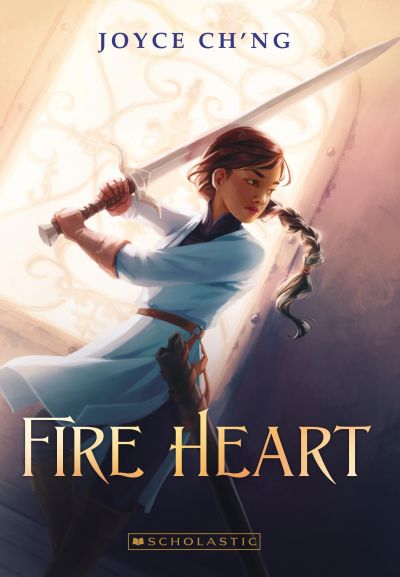Closer To the Heart
Fire Heart
By Joyce Ch'ng

27 Jan, 2023
2022’s Fire Heart is a coming-of-age secondary world fantasy novel.
Wehia t’Doniyat comes from a respectable family of knifesmiths in what may politely be deemed “the sticks.” Wehia could live a very respectable life following in the footsteps of her mother and aunts. However, Wehia wants to forge swords, a career not available in her village.
Conveniently for Wehia, she is related (if not terribly closely) to Hadana t’Tonali, a respected swordsmith in the City of Swords. Wehia is sufficiently ambitious that when Hadana agrees to consider Wehia as an apprentice, Wehia leaves family and home behind to travel to the City.
Success is in no way guaranteed.
Even if Wehia were considered by her village to be the best of the best at knifemaking (which she is not), being elite out in the boonies means nothing in the City. As well, knives are useful, even valuable, but they do not compare to the glory that is swords. Hadana sets Wehia to a string of onerous, humble tasks, thus to assess whether Wehia is worth the time and effort it would take to train her. Wehia embraces her tasks with all the passion one might expect from an ambitious, overconfident person, which is to say rather grudgingly.
The reward for convincing Hadana that she might have the making of an acceptable apprentice is, of course, more work. There are many important considerations that go into making a top-quality sword, from the theoretical to the practical. Hadana requires Wehia to gain command of all applicable skills.
This course of study is by its nature difficult and time consuming. Wehia needs to be not just hardworking, but the sort of person who can pursue goals for years without wavering, without giving in to distraction. Few can manage such relentless purpose, which is why only a few can create swords as fine as Hadana’s.
Wehia has ambition. Singular focus is another matter. She is easily distracted. A friend might be married off against her will? Wehia must intervene! Calamitous news from home? Wehia must rush home. What Wehia needs is a shortcut to success.
As she will find out, there are no shortcuts. There are, at best, learning opportunities.
~oOo~
Readers might wonder why swords are more prestigious than knives. Knives are utilitarian tools for everyday activities; many are needed, good ones are preferred. Swords, on the other hand, are basically only good for combat and are a rather resource intensive solution to the problem of killing people compared to, say, spears. Why swords?
Blame the upper class. Some high-status people in this society delight in dueling on flimsy pretexts. A flashy, well-made sword is just the thing to deliver pointed responses to suspected affronts. Swords are also quite useful when keeping social outcasts in line, but I suspect that if the dueling culture didn’t exist, other weapons would be used.
There are a lot of coming-of-age books where it turns out the older generation insists on stupid tradition because old people are hidebound and incapable of the clarity of vision provided by inexperienced young people. This isn’t one of those books1. Hadana isn’t perfect (the attempted arranged marriage being an example) but she is right that there’s no easy path to smithing. To try to find one, even if one is the endearing, plucky protagonist, is to forge unreliable swords.
There are other coming-of-age books in which a lone young idealist notices entrenched social ills and easily solves them. This is not one of this novels. Getting an idea of what’s wrong with society2 is about as far Wehia gets.
This is a very fast read, even for a two-hundred-odd page novel. I picked it up meaning to get a head start on the book, and found myself finishing it. Wehia is an engaging young woman, and her poor choices always move the plot along nicely. The only thing about this book that I didn’t like is the lack of closure. Several plotlines are left dangling. After having read the book, I suspect that this might be the first volume of a series, but there’s no hint that this is the case. On the outside, the book looks like a stand-alone. I hope more books in the series follow.
As far as I know, Fire Heart is for sale in Asia and only in Asia. However, those outside Asia may obtain it from Singapore’s own Closet Full of Books. It’s available as a deadtree book only, but ordering and shipping were easy and fast.
1: Leaving aside the manner in which outcasts are treated, which is to say badly and in ways that leave the outcasts little reason not to strike back. The reasons for this are unclear because the adults in the know are very reluctant to discuss them.
2: Beyond “this particular tradition is inconvenient to me”, I mean. Everyone is very quick to notice when custom impedes them personally.
